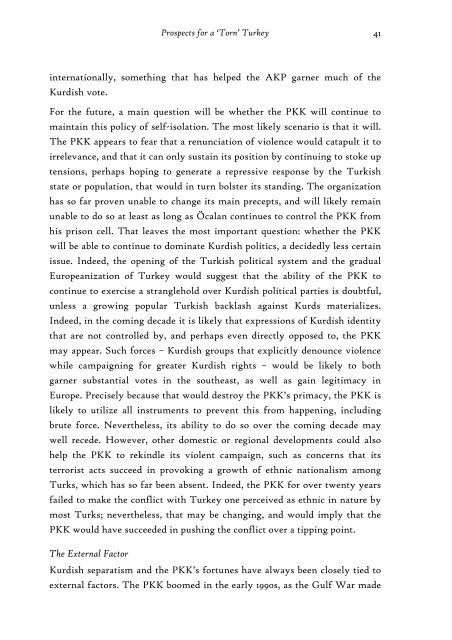2008_10_SRP_CornellKaraveli_Turkey
2008_10_SRP_CornellKaraveli_Turkey
2008_10_SRP_CornellKaraveli_Turkey
Create successful ePaper yourself
Turn your PDF publications into a flip-book with our unique Google optimized e-Paper software.
Prospects for a ‘Torn’ <strong>Turkey</strong> 41<br />
internationally, something that has helped the AKP garner much of the<br />
Kurdish vote.<br />
For the future, a main question will be whether the PKK will continue to<br />
maintain this policy of self-isolation. The most likely scenario is that it will.<br />
The PKK appears to fear that a renunciation of violence would catapult it to<br />
irrelevance, and that it can only sustain its position by continuing to stoke up<br />
tensions, perhaps hoping to generate a repressive response by the Turkish<br />
state or population, that would in turn bolster its standing. The organization<br />
has so far proven unable to change its main precepts, and will likely remain<br />
unable to do so at least as long as Öcalan continues to control the PKK from<br />
his prison cell. That leaves the most important question: whether the PKK<br />
will be able to continue to dominate Kurdish politics, a decidedly less certain<br />
issue. Indeed, the opening of the Turkish political system and the gradual<br />
Europeanization of <strong>Turkey</strong> would suggest that the ability of the PKK to<br />
continue to exercise a stranglehold over Kurdish political parties is doubtful,<br />
unless a growing popular Turkish backlash against Kurds materializes.<br />
Indeed, in the coming decade it is likely that expressions of Kurdish identity<br />
that are not controlled by, and perhaps even directly opposed to, the PKK<br />
may appear. Such forces – Kurdish groups that explicitly denounce violence<br />
while campaigning for greater Kurdish rights – would be likely to both<br />
garner substantial votes in the southeast, as well as gain legitimacy in<br />
Europe. Precisely because that would destroy the PKK’s primacy, the PKK is<br />
likely to utilize all instruments to prevent this from happening, including<br />
brute force. Nevertheless, its ability to do so over the coming decade may<br />
well recede. However, other domestic or regional developments could also<br />
help the PKK to rekindle its violent campaign, such as concerns that its<br />
terrorist acts succeed in provoking a growth of ethnic nationalism among<br />
Turks, which has so far been absent. Indeed, the PKK for over twenty years<br />
failed to make the conflict with <strong>Turkey</strong> one perceived as ethnic in nature by<br />
most Turks; nevertheless, that may be changing, and would imply that the<br />
PKK would have succeeded in pushing the conflict over a tipping point.<br />
The External Factor<br />
Kurdish separatism and the PKK’s fortunes have always been closely tied to<br />
external factors. The PKK boomed in the early 1990s, as the Gulf War made


